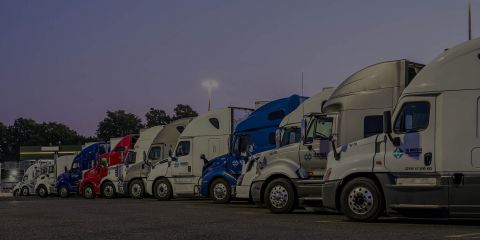2022
The Definitive Guide To Choosing a Third-Party Logistics Partner

Third-party logistics providers (3PLs) allow businesses to outsource their transportation or warehousing, and may be an essential component of operations for many companies.
Businesses that are looking to outsource to a third-party logistics partner are given freedom to focus more on their core competencies and access supply chain technology and globalization, fueling their business growth.
Choosing a third-party logistics partner is a big decision, however. These companies can impact every aspect of a business, for better or worse, and it’s important to consider the decision carefully.
Evaluation of Potential Providers
As the logistics industry grows, new logistics companies are seemingly popping up overnight. These providers may not have the experience, technological advancement, reputation, stability, or systems to provide consistent service to their clients.
Any business looking to partner with a logistics provider needs to carefully consider the pros and cons of all prospective providers. These companies are providing a service, but they’re also acting as partners in your business – every aspect of their operations will reflect on your business as well.
Whether you’re a new business getting a logistics provider for the first time or you’re looking to make a switch, it’s vital to evaluate all potential partners and their resources and capabilities to ensure they’re a good fit.
An established third-party logistics provider should have the existing capabilities to integrate into your current systems and processes, or at least, the knowledge to find a solution that fits your business’s needs.
You should also consider the provider's industry experience, stability, operating regions, owned vs. rented assets, compliance history, and more, to ensure it will have a positive impact on your business.
Your relationship with your third-party logistics partner is supposed to be long term, so be sure to thoroughly evaluate the advantages and disadvantages of each potential provider. If possible, look at client reviews or ask for references to find out more about the company’s strengths and weaknesses.
Value-Added Services
Logistics providers are not one-size-fits-all solutions. Some providers will offer specific industry solutions, commodity services, or value-added services, while others will focus on multi-function supply chain management.
Some providers also have specializations, including proficiency in specific aspects of the supply chain, end-to-end services, or value-added services specific to an industry. These value-added services can be an advantage for your partnership. Consider options like product kitting, reverse logistics, quality control, and returned material authorization agreements and how they may affect your operations.
Advanced Technology
Technological sophistication is disrupting the supply chain and logistics industry and giving businesses more agility in addressing global supply chain delays and challenges.
If you’re looking to maximize the potential of technology, consider logistics partners with the IT infrastructure to support your operations. Many logistics providers have their own technology solutions to support their services, such as warehouse management systems, inventory analytics, and fleet tracking systems.
Some providers may also offer specialized technology solutions, such as fleet tracking with RFID or theft management. Technology solutions should be scalable with cloud-based warehouse management and electronic data interchange (EDI) capabilities. You should also consider options for inventory management, order processing, automation, and tracking orders.
Optimized Distribution Networks
On top of the delays in the global supply chain, businesses are navigating ongoing challenges like quality control issues, damage, and theft. Without a logistics provider with an optimized distribution network, your business could have vulnerabilities at multiple points in transport.
Consider the warehousing asset ecosystem of your prospective third-party logistics providers. Choosing a partner with a strategic network and optimized distribution can offer valuable options like storage for goods on different routes that can help with theft, damage, and quality control.
Be sure to thoroughly evaluate the facilities, their features, their locations, and the typical volume. Delays during high-volume sales periods or at specific ports can be significant, but a logistics partner with a vast network can minimize the delays and disruptions that may arise.
Omnichannel Capabilities
An omnichannel experience is a seamless customer experience across all touchpoints with a brand. Promoting an omnichannel experience is critical in the current environment, and logistics providers can help with making this goal a reality.
A third-party logistics provider with an in-depth understanding of the expectations and demands within a specific industry is beneficial. The specific needs of your business may vary, but a logistics provider with experience and expertise in your industry can help you make the most of your partnership.
It’s important to consider not only your current market needs, but your needs in the future as your business scales. Choose a partner who can support you in the future, as well as right now.
Business Alignment
Logistics providers and their clients are a long-term professional partnership. The operations and reputation of each reflect on each other, so it’s crucial to choose a partner with similar business alignment and brand values.
You should consider your potential providers financial stability, compliance history, and dedication to staying agile in the competitive market. It takes time to evaluate potential partners, but it’s best to be patient and thorough to find the right fit from the start.
Customer Service
Your logistics partner not only delivers customer service to you as a client, but affects the customer service you provide to your own clients. It’s important to seek out a partnership with a provider who offers a similar level of commitment to customer service, communication, responsiveness, and expectations.
Many logistics providers will tout their exceptional customer service – like virtually every other business – but these are just words. Not all businesses meet their promise of customer service, and you should consider reviews, references, and other details to see how satisfied their clients are with their service.
Remember, customer service is vital to your business’s success. Providing an exceptional customer service experience doesn’t just happen – it’s cultivated through systematic processes and commitment.
In addition, a logistics provider with a commitment to customer service will likely have a commitment to safety as well, since these two situations are strongly connected. A logistics provider with a strong record of customer service will probably have good safety records, and vice versa.
Find Your Next 3PL Partner
The logistics industry is becoming more saturated, but not all third-party logistics providers are created equal. It’s important to conduct thorough research and weigh the advantages and disadvantages of your prospective provider, including reputation, stability, safety records, policies, and available value-added services.
For over 30 years, 18 Wheels Logistics has strived to be the most customer-centric trucking, warehousing, and logistics company around. Based in Vancouver, British Columbia, Canada, 18 Wheels relies on experience and integrity to make customers happy and remain on the cutting edge of shipping and logistics management.
If you have any questions about this article or you would like to talk to us about your shipping needs, please call us at (604) 439-8938.
